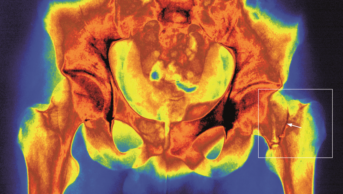
Dr P Marazzi / Science Photo Library
People with Alzheimer’s disease who are taking benzodiazepines have an increased risk of developing pneumonia, a large study suggests.
Using national Finnish registry data on people with Alzheimer’s living in the community, researchers compared the effects of benzodiazepines and Z-drugs, another class of other sedative drugs, with those not prescribed either treatment.
In the analysis of 5,232 patients with Alzheimer’s taking benzodiazepines, the researchers found a 28% increased risk of pneumonia diagnosis when compared with the same number of patients with the disease who had not been prescribed the drugs.
There was no statistically increased risk of taking Z-drugs in the analysis of 3,269 patients and case-matched controls, but the study did not directly compare the drugs with benzodiazepines.
The study, published in the Canadian Medical Association Journal[1]
, found that the risk of pneumonia was highest during the first 30 days of taking benzodiazepines (hazard ratio 2.09). Patients in the study were more likely to be female and had an average age of 80 years.
Heidi Taipale, study leader and researcher at the School of Pharmacy, University of Eastern Finland, says that the study adds to the evidence that benzodiazepines should be used cautiously in this population, but that it takes time to change prescribing patterns. “Benzodiazepines have been the basic option for pharmacological treatment of behavioural and psychological symptoms of dementia for decades.

Source: Courtesy of Heidi Taipale
Heidi Taipale, study leader and researcher at the School of Pharmacy, University of Eastern Finland, says the study adds to the body of evidence that benzodiazepines should be used cautiously in patients with Alzheimer’s, but acknowledges that it takes time to change prescribing behaviours.
“Lack of effective and safe alternatives for benzodiazepines is also a problem. More focus should be put on non-pharmacological options, both research on the effectiveness of non-pharmacological treatments among persons with dementia and how they can be implemented in clinical practice,” she adds.
One theory put forward by the researchers, based at several institutions across Finland, is that the sedative effects of benzodiazepines may increase the risk of pneumonia by boosting the likelihood of aspiration of saliva or food into the lungs.
This theory correlates with the study’s finding that pneumonia risk is highest at the start of benzodiazepine use, as the sedative effect is more pronounced initially before tolerance is built up, the researchers say.
Evidence increasingly supports a link between these drugs and adverse respiratory effects, which suggests that more research is needed to fully understand the mechanisms underpinning the risk, they add.
In an accompanying editorial[2]
, Paula Rochon from Women’s College Hospital and the University of Toronto, Canada, said the study was a reminder of the problems associated with prescribing these drugs in frail older patients.
“Non-pharmacologic approaches should be the starting point when managing neuropsychiatric symptoms in this patient population, which should help to limit inappropriate use of these drugs,” she says.
Rosa Sancho, head of research at Alzheimer’s Research UK, says: “Benzodiazepines can be given to people with Alzheimer’s to help calm very aggressive behaviour, but their use must be carefully weighed up against the risk of side effects for each individual.
“This new study suggests that the increased risk of pneumonia should be taken into account.”
References
[1] Taipale H, Tolppanan AM, Koponen Met al. Risk of pneumonia associated with incident benzodiazepine use among community-dwelling adults with Alzheimer’s disease. CMAJ 2017 April 10;189:E519-29. doi: 10.1503/cmaj.160126
[2] Rochon PA. The harms of benzodiazepines for patients with dementia. CMAJ 2017 April 10;189:E517-8. doi: 10.1503/cmaj.170193


